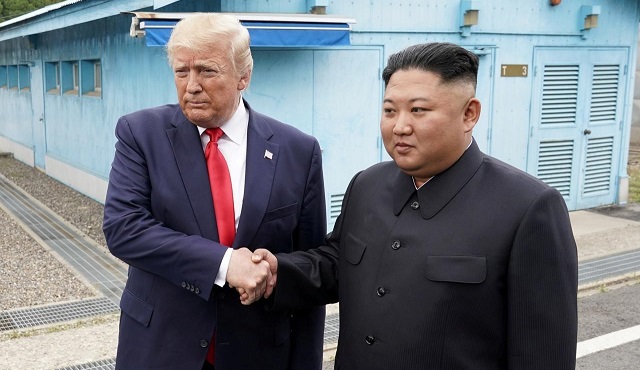With China Reeling, A Strategic Opportunity With North Korea

So much has been happening recently in the world that North Korea has all but disappeared from the front pages. The elimination of Qasem Soleimani in Baghdad, the impeachment inquiry farce, the Iowa circus, the COVID-19 threat of a pandemic, have monopolized public attention for weeks.
However, North Korea is not going away and President Trump has certainly not forgotten the issue, especially since China, of late, has never been weaker. Hong Kong’s yearlong demonstrations, triggered by an ill-conceived extradition bill, hit China’s “one country, two systems” principle at its heart and the result was immediately reflected by the elections in Taiwan where the incumbent pro-independence candidate Tsai Ing-Wen won in a landslide. The news of the coronavirus epidemic, long denied and badly suppressed, could yet become a dangerous “Chernobyl” moment for the regime who is now struggling not only to contain the virus, but also to save its international reputation and perhaps fighting for its very survival.
Some people have criticized recent U.S. North Korea policy, others have praised it. Both parties assume that America’s policy is to get Kim Jong Un to abandon its nuclear program. Both are wrong.
One of the many fallouts of having waged war in Libya to depose Muammar Qaddafi to score cheap political points was that it sent a warning to all wannabe dictators: “Renounce your nuclear program and it will be the end of you.” And so it was for Qaddafi: a few years after abandoning terrorism and giving up its nuclear weapons, he was hunted down and killed like a dog (destabilizing Europe and creating an immigration crisis, among other things).
Kim Jong Un is smart, ruthless, and knows very well his own weaknesses and strengths. He will never renounce his nuclear program which is his only deterrent against the West and of course, China.
All Trump can do after decades of U.S. presidents kicking the can down the road, is try to bring North Korea into the fold of U.S. litigious but loyal allies in the Pacific, such as South Korea and Japan (wouldn’t the video of a North Korea booming with tourism and resorts and investments which Trump showed Kim during their first meeting then make perfect sense?).
North Korea, and Kim Jong Un in particular, seems squeezed between China and its own Army. What better moment then this for the West and in particular for the Pacific nations to apply pressure on the regime while China is struggling with problems of its own, its economy declining, Xi Jinping is under siege by his own party and an angry population that is finally losing its fear of the regime? Surely it will be less inclined to interfere directly into its neighbor’s affairs.
Despite Kim’s protestations of self-reliance to appease critics of the regime’s past and present mistakes, he must realize that no country can survive and prosper without external help and support. Furthermore, its isolation is inevitably crumbling and getting more and more difficult to enforce in an increasingly technological world. America and its Pacific allies should therefore increase communications with North Korea’s population by any means available so that more and more people (including low and medium level Army officers) are informed and aware of the alternative world out there. Aid should be delivered directly to people as much as possible to deprive the regime of claiming phony successes, while at the same time letting it be known that prosperity, thanks to an industrious and disciplined population, would be easily achievable. Obviously, most of the above would weigh on South Korea’s shoulders who the U.S. should support in full.
Is this the path to a One Korea? Too early to say, although there have been various tentative approaches to the unification process between North and South, often disrupted by incidents, provocations or unacceptable pre-conditions. However, recent developments and more proactive attitudes from all stakeholders as indicated above might in the medium-term lead to overcoming the bottlenecks hindering a reconciliation.
While North Korea could bring to the table its nuclear armament as deterrent in a dangerous neighborhood, South Korea would contribute with its technology and an economy fifty times that of the North. Both would benefit greatly.
Denuclearize North Korea? Too late for that. But there is an opportunity right now.
COLUMN BY
THOMAS HUDSON
Thomas Hudson has worked as Manager and Head of Corporate Support Services for private and international organizations, including the UN, in many countries. (Thomas Hudson is a pseudonym.)
EDITORS NOTE: This Revolutionary Act column is republished with permission. © All rights reserved.


Leave a Reply
Want to join the discussion?Feel free to contribute!